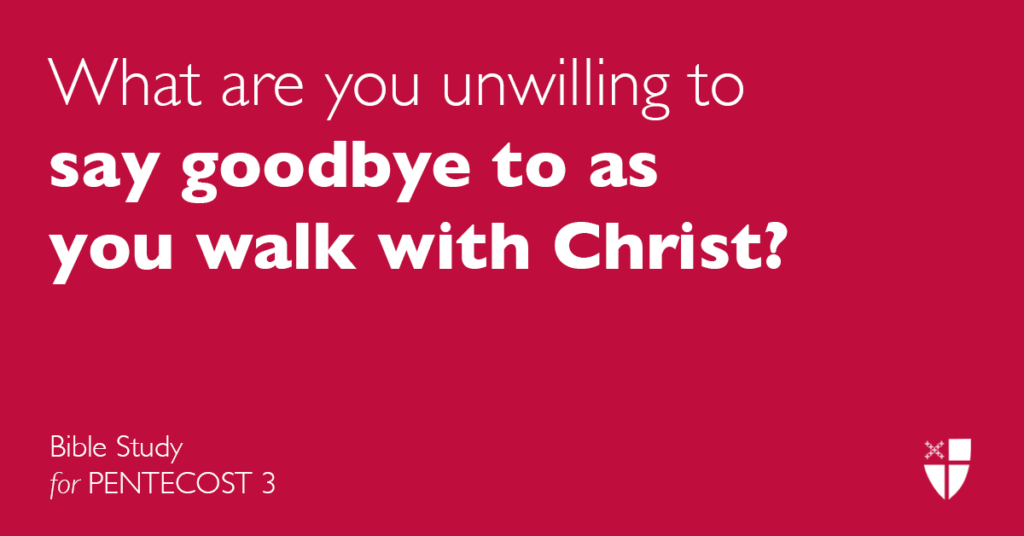This page is available in: Español
Bible Study: Proper 8 (C) – 2019
June 30, 2019
1 Kings 19:15-16, 19-21

Elijah is a tired prophet at this point in 1 Kings, though that’s difficult to tell from this small pericope. Elijah has just experienced the “fine” or “thin” sound in a cave on the mountain, revealing the Lord’s presence. But he is still tired. The beginning of the end of his prophetic career looms. The Lord tells him to anoint Elisha as his successor.
Elisha’s response to the passing of the mantle is a bit bizarre; he asks to return to kiss his mother and father, but when Elijah seemingly gives him permission to do so, Elisha makes a ritual meal and provides a sacrificial thanks-offering for “the people.” Elisha leaves to follow Elijah, to become his servant (not yet his successor), without saying goodbye.
Elijah is getting ready to leave his prophetic calling; Elisha is leaving his family. We have a story of departures and endings in this Old Testament text. We encounter a prophet who is tired and a successor ready to work for the Lord at whatever cost.
- Where has God showed up in the endings and departures in your community?
- What does “passing the mantle” teach us about sharing the load?
Psalm 16
“In your presence there is fullness of joy”
I wonder what joy looks like most days. Does it look like simple, routine, ordinary moments of purpose and connection? Is it having a hand to hold in the dark night? Is it a well-made meal around a table with loved ones? Is it ecstasy? Joy is the above and so much more. But our psalmist points us to the source of the “fullness of joy” – to the God who protects you and is before you and who gives you counsel. In God’s presence, there is fullness of joy. And like Elijah experienced earlier in 1 Kings 19, the presence of God is sometimes unexpected, unusual, wholly different from one’s previously conceived notions. The presence of God can be as quiet as silence, as mysterious as a burning bush that is never consumed, and as miraculous as bread and wine offered to us at God’s table. Joy is found wherever we encounter God.
- Where are you finding the “fullness of joy” right now?
- How are you practicing mindfulness or attentiveness to the presence of God?
Galatians 5:1, 13-25
Paul asks us to consider using our freedom that Christ has gifted us not for self-indulgence. But instead, to use our freedom in acts of service – “becom[ing] slaves of one another.” Here, we see Paul framing freedom in terms of “freedom for” rather than “freedom from.” The Christ-followers, filled with the good fruits of the Spirit, will not hoard their freedom selfishly; they will generously share with others this freedom and even more, they will give their freedom away for the sake of their brothers or sisters.
It’s almost impossible to not hear the political ramifications of such language in our day and age. I’m sure in Paul’s day, it was also impossible to not hear the political implications of his letter. With freedom bearing the connotations of a “right” to hoard in our American context, Paul’s words are challenging and accosting. He is asking us to seriously evaluate how we use our freedom – and who we are using it “for.” And if we are biting and devouring our neighbors, or not even paying attention to them, are we not making fools of ourselves and the gift of Christ?
- Whose liberation is at stake in your community or context – and how can you serve them?
- What are the roadblocks that you need to address for your community to hear Paul’s loaded words?
Luke 9:51-62
This is the turning point in Luke. Jesus has set his face towards Jerusalem, and he begins to travel, to pilgrim towards that wooden cross. Inherent in this specific journey is loneliness. The Samaritan village won’t accept him – it’s as if they can already see the shadow of the crucifixion on his brow. And then three would-be-followers are not quite ready for the lonely journey: they have expectations about where Jesus is going and fathers to bury and family members to say goodbye to. Jesus isn’t sure that these followers are ready for the sacrifice.
The immediacy of Jesus’ mission becomes palpable in this text. Jesus is no longer lingering at dinner tables but must journey onward. To join him in the journey is no small voyage. It is a journey that will take you away from your beloved ones, that will strip you of all sense of home; it’s a pilgrimage that leads you to the cross of Jesus Christ.
And for what?
So that you can be near to the one who promises to journey with us. So that you can bear witness to the death-dealing ways of this world. So that you can build a new home with the One who has nowhere to lay his head. In it all, we are promised that the journey is worth it.
- What are you unwilling to say goodbye to as you walk with Christ?
- How has Christ transformed your lonely pilgrimage?
This page is available in: Español
Don’t forget to subscribe to the Sermons That Work podcast to hear this sermon and more on your favorite podcasting app! Recordings are released the Thursday before each liturgical date.
Receive Free Weekly Sermons That Work Resources!
This page is available in: Español


